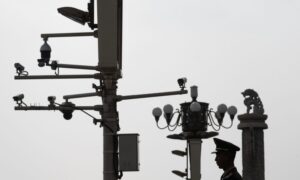A Chinese restaurant in South Korea has decided to close operations after reports that it served as a covert Chinese police station allegedly used by Beijing to suppress dissidents overseas.
The restaurant, which is located in Gangnam city of Seoul, has denied the allegations. Its official said the eatery will end operations by next month and that its closure was not related to the reports, Yonhap News Agency reported.
“The planned closure is not related to the news on secret police stations. We’ll be closing business because a yearlong lawsuit is now over,” the restaurant’s official said, adding that it received an eviction request by Jan. 1.
The restaurant initially announced that it would be temporarily closed from January next year for “interior work.” It also issued a notice saying that “only guests with reservations are accepted” to enter the restaurant.
Local media reported that South Korean authorities were inspecting the Chinese restaurant and its business conditions on suspicion that it served as a base of a covert Chinese police station in the capital city of Seoul.
This came as a report by the Spain-based human rights watchdog Safeguard Defenders revealed that China was running 102 police stations across 53 countries, mostly in the West, which were allegedly used to target Chinese nationals living abroad.
South Korea’s Foreign Affairs Ministry said Tuesday that authorities are investigating the matter but that they have not yet discovered “anything significant.”
The Chinese Embassy in South Korea dismissed the allegations as “groundless” and denied that such police stations existed. It urged the media to cease all “acts of fabrication” and focus on the “friendship” between China and South Korea instead.
Japan was also listed in the report and is looking into similar claims.
Chinese Diaspora ‘Live in Fear’
The overseas Chinese stations are set up and run by a few Chinese regional public security authorities in collaboration with Chinese overseas associations and some business communities.
Safeguard Defenders have identified four different Chinese local police jurisdictions. It claimed that the Chinese police department in Jiangsu Province set up at least one police station in South Korea, but that its location could not be confirmed.
As for Japan’s case, the report states that China’s Fuzhou police department had set up a service station in Japan’s capital city of Tokyo, while Nantong police had a similar station somewhere else in the country.
The Chinese regime has claimed that the centers are run by volunteers to provide administrative services to overseas Chinese citizens, such as passport renewal.
The report pointed out that these covert overseas Chinese police stations are extensions of the regime’s control over Chinese ex-pats and immigrants. The Chinese police have admitted that the stations are for “using overseas Chinese to govern overseas Chinese.”
The Netherlands, Ireland, and Canada have already ordered investigations into the Chinese police stations in their territories. They consider the establishment of such overseas Chinese police service stations, regardless of their purposes, illegal and in violation of the Vienna Convention.
Safeguard Defenders founder Peter Dahlin wrote in his analysis article for The Epoch Times that until all the overseas Chinese police stations are shut down, “the Chinese diaspora across the United States, Canada, and elsewhere will live in fear, be unable to speak out freely, and be denied their democratic rights in their new homeland.”
“For them, it’s a matter of basic democratic freedoms that are being denied to them because of communist China’s growing presence overseas, where these stations are yet another tool in ‘using overseas Chinese to govern overseas Chinese.’”
Alex Wu and Reuters contributed to this report.


